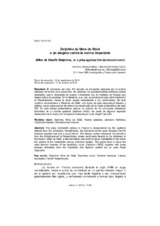Delphine de Mme de Stäel o un alegato contra la norma imperante
Mme de Stäel’s Delphine, or a plea against the dominant norm
Autor
Huertas Abril, Cristina
Martínez Ojeda, Beatriz
Editor
UCOPressFecha
2012Materia
DelphineStaël-Holstein, Germaine de, 1766-1817
Novela epistolar
Literatura feminista
Traducción literaria
Romanticismo francés
Epistolary novel
Feminist literature
Literary translation
French Romanticism
METS:
Mostrar el registro METSPREMIS:
Mostrar el registro PREMISMetadatos
Mostrar el registro completo del ítemResumen
El comienzo del siglo XIX francés se encuentra marcado por la euforia derivada del triunfo de la revolución. No obstante, los acontecimientos históricos pronto mostrarían que lo alcanzado en cuanto a libertades fue, en realidad, un fracaso que desencantó a la sociedad. En la literatura, a su vez, se produce el paso de la Ilustración al Romanticismo, donde la razón queda subordinada a los sentimientos. En este contexto encontramos a Madame de Stäel, una figura de gran importancia literaria y política, cuyas obras ponen de relieve las inquietudes de la mujer aristocrática del siglo XIX. En este trabajo pretendemos realizar un estudio de los principales elementos feministas de su novela epistolar Delphine (1802), así como de algunos aspectos destacados de la traducción al español realizada por Juan Ángel Caamaño. The early nineteenth century in France is characterized by the euphoria derived from the revolution. Nevertheless, the historical events soon showed that the freedom reached was just a social failure. The literary context witnesses the transition from the Enlightenment to Romanticism, where sentiments flourish to the detriment of the reason. Mme de Stäel, a relevant literary and political figure, highlighted in her works the worries of the nineteenth century aristocrat women. This paper aims to study the main feminist features of her epistolary novel, Delphine (1802), together with some relevant reflections from the translation into Spanish carried out by Juan Ángel Caamaño

